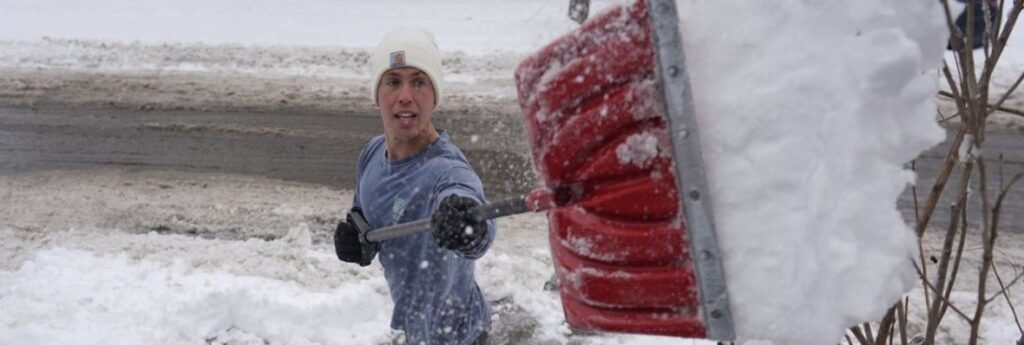The plunging polar vortex brought subfreezing temperatures Tuesday to some of the southernmost points of the US, threatening to dump snow on parts of Texas and Oklahoma in the coming days and contributing to a power outage in Virginia’s capital that made the water unsafe to drink. Floridians were warned to watch for falling lizards (from trees due to the cold);
The arctic blast that descended on much of the US east of the Rockies over the weekend has caused hundreds of car accidents, thousands of flight cancellations and delays, and led communities to set up warming shelters, including one at a roller rink.
As the cold front moved southward Tuesday, it prompted a cold weather advisory for the Gulf Coast and pushed the low temperature in El Paso, along Texas’ border with Mexico, to minus 0.5 Celsius), with an expected wind chill factor ranging from minus 18 to minus 9 Celsius early Wednesday, according to the National Weather Service.
Road crews in the Kansas City area, which has received about 28 cm. of snow in recent days, have struggled to keep up with clearing the area’s streets and highways.
“I don’t know what super powers some think snow removal teams have but two days of straight snow and ice isn’t going to disappear overnight,” the Unified Government of Wyandotte County and Kansas City, Kansas, wrote Monday in a Facebook post.
In frigid northern Virginia, Carol Grayson said Monday that she wished she had a metal shovel – not her plastic one – as she tried to carve a path for her beagle, Rudy, and sheltie, Emma.
The great-grandmother, who declined to give her age, said shoveling through nearly frozen snow that went up to her knees was “like climbing Mount Everest.” Her neighbourhood in Alexandria was once populated with teenagers who’d offer to help. But they’ve all grown up and moved away.
“We’re not used to it here, and we’re just not prepared,” Grayson said.
As points north and east dug their way out of snow and ice Tuesday, communities in Texas, Oklahoma and Arkansas were preparing for their own helping. A low-pressure system was expected to form as soon as Wednesday near South Texas, which could bring several centimetres of snow to the Dallas area and lower Mississippi Valley, the weather service said.
In Texas, crews treated the roads in the Dallas area in anticipation of a storm that was expected to bring up to 10 cm. of snow on Thursday. As much as 15 cm. was expected farther north, near the Oklahoma border, said weather service meteorologist Sarah Barnes.
Kevin Oden, Dallas’ director of emergency management and crisis response, said Tuesday that “our city is in a preparedness phase.”
The polar vortex of ultra-cold air usually spins around the North Pole, but it sometimes plunges south into the US, Europe and Asia. Some experts say such cold air outbreaks are happening more frequently, paradoxically, because of a warming world.
Transportation has been tricky
An area stretching from the central Plains through the Ohio Valley into the Atlantic is likely to receive more snow and ice for a few days, which could cause the ground covering to melt and refreeze and form black ice, according to forecasters. That could create treacherous road conditions.
A Kentucky truck stop was jammed Monday with big rigs that had been forced off of snow-covered Interstate 75 just outside Cincinnati. Michael Taylor, a long-haul driver from Los Angeles carrying a load of rugs to Georgia, said he saw numerous cars and trucks stuck in ditches and was dealing with icy windshield wipers before he pulled off the interstate.
“It was too dangerous. I didn’t want to kill myself or anyone else,” he said.
Hundreds of car accidents were reported in Virginia, Indiana, Kansas and Kentucky, where a state trooper was treated for non-life-threatening injuries after his patrol car was hit.
Virginia State Police responded to 650 crashes, some of which were likely storm related, between Sunday afternoon and Monday night, that resulted in three deaths.
More than 1,000 flights into or out of the US were had been delayed as of Tuesday morning, according to tracking platform FlightAware. On Monday, more than 2,300 flights were cancelled and at least 9,100 more were delayed nationwide.
Ronald Reagan Washington National Airport reported that about 58% of arrivals and 70% of departures had been cancelled. The airport announced early Tuesday that it had reopened all runways after closing them Monday evening so that crews could focus on snow removal and prevent refreezing on the airfield.
Many were in the dark as temperatures plunged. About 200,000 customers were without power Tuesday across Kentucky, Indiana, Virginia, West Virginia, Illinois and Missouri, according to electric utility tracking website PowerOutage.us.
If this article was shared with you by a friend or colleague, you may enjoy receiving your own copy of Travel Industry Today with the latest travel news and reviews each weekday morning. It’s absolutely free – just CLICK HERE.

